In the history of Game of Thrones shows, the ninth episodes of each season are typically reserved for big-budget, action-packed set pieces and stunning, treacherous reversals of fortune–Ned Stark’s beheading, the Battle of the Blackwater, the Red Wedding, the Battle of the Bastards. In this penultimate episode of its first season, House of the Dragon subverted those expectations by delivering—explosive ending notwithstanding—a slow-burn episode of growing tensions, two-hander scenes between close allies with fracturing relationships, and a blow-by-blow account of the first twenty-four hours of a coup. We’ll be diving into how this complicated thriller of an episode deviates in both large and small ways from Fire & Blood’s fictional history while still paying homage to its core moments. Spoilers below the break…
Updated Main Titles
The main titles now reflect the death of King Viserys, with his metal dial filling with blood and pouring down into Alicent’s (Olivia Cooke) dial—a golden flame set into a seven-pointed star that crowns the Hightower sigil and is ringed with Hightower green. Oddly enough, we see Alicent’s bloodline take one detour that seems to represent her father (Rhys Ifans), with his Hand of the King symbol of office before it empties into the sigils for her three adult children: Aegon (Tom Glynn-Carney), represented by his vices in the form of a wine goblet whose stem is a nude, kneeling woman; Helaena (Phia Saban), represented by the spiders she is so fascinated by; and Aemond (Ewan Mitchell), represented by a sapphire. In the novel, rather than wearing an eye-patch, Aemond places a large sapphire into his empty eye socket. Aegon and Helaena’s bloodlines flow together into three separate dials representing their three toddler-aged children: Jaehaerys, Jaehaera, and Maelor. Elsewhere, Daemon’s (Matt Smith) piece now flows together with Rhaenyra’s (Emma D’Arcy). Separate bloodstreams for Rhaenyra’s children with Harwin Strong and Daemon’s children with Laena Velaryon are sidelined for their two children together, Aegon and Viserys.
The Title
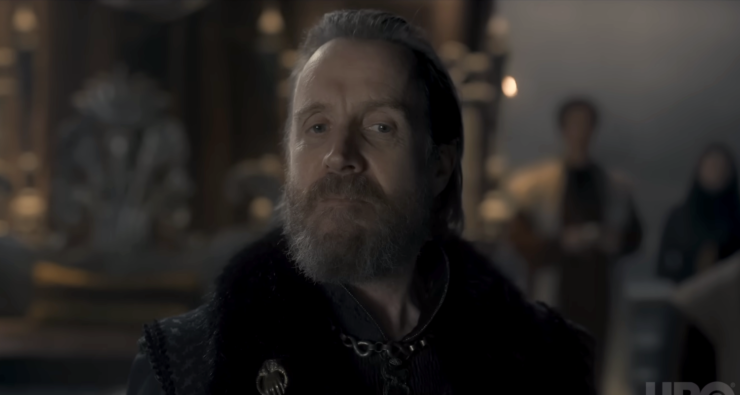
“The Green Council” refers to Viserys’ small council just after his death—made up of his hand, Ser Otto Hightower; his widow, Queen Alicent; the Master of Ships, Tyland Lannister (Jefferson Hall, who also plays Tyland’s profligate twin, Jason); the Master of Laws, Jasper Wylde–called “Ironrod” (Paul Kennedy); Grand Maester Orwyle (Kurt Egyiawan); and Ser Criston Cole (Fabien Frankel) who, in Martin’s original texts is already Lord Commander of the Kingsguard.
In Fire & Blood, the Green Council’s calculated, underhanded corruption culminates in the coup which leads to the Targaryen internecine succession crisis called “the Dance of the Dragons.” The show, however, makes the Green Council a far more fractured and complex affair. In his book, Martin portrays Otto and Alicent as being essentially of the same mind about the need to depose Rhaenyra and crown Aegon. Showrunners Miguel Sapochnik and Ryan Condal portray Alicent as trying to walk a middle ground, convinced that Viserys wanted Aegon to be king but shocked and dismayed that her father and other members of the small council have been planning the coup for a long time. Much of the episode that follows is a race against time where Ser Criston and Aemond attempt to find Aegon and bring him into the Queen’s custody, while twin Kingsguard members, Ser Arryk (Luke Titensor) and Ser Erryk Cargyll (Elliot Tittensor), try to deliver him to Otto.
All in all, “The Green Council” as an episode is an exercise in making the audience question whether or not a Green Council, the political faction, really exists. At the outset of this section of Fire & Blood, Alicent, Ser Criston, Otto, and Larys Strong are an established hegemonic block that share the same goals. But here, they are a roiling mass of plots and counterplots as unsavory as Larys Strong (Matthew Needham) touching himself while staring at the Queen’s feet and offering, in short order, to report on her to her father. The show continues to do excellent work in making Alicent Hightower a conflicted and tragic figure caught between her own ambition, her loyalty to the patriarchy, and her too-late realization that she has been carelessly and cruelly misused by the men in her life. She is many things, but she is never merely her father’s catspaw.
Unreliable Narrators: The Green Coup
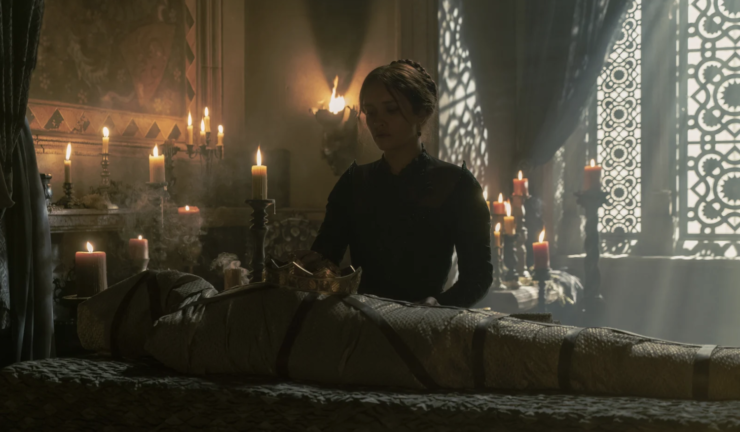
George R.R. Martin’s 2013 novella, The Princess and the Queen, begins—after a brief preamble about the historical period in general—with the following paragraph, one of the few ported over, wholesale, to Fire & Blood, five years later:
Long simmering, the conflict burst into the open on the third day of third moon of 129 AC, when the ailing, bedridden King Viserys I Targaryen closed his eyes for a nap in the Red Keep of King’s Landing, and died without waking. His body was discovered by a serving man at the hour of the bat, when it was the king’s custom to take a cup of hippocras. The servant ran to inform Queen Alicent, whose apartments were on the floor below the king’s.
This episode begins with precisely that moment, meaning that the series and its central concern really begins in earnest with this entry. The show, however, always interested in complicating Fire & Blood’s birds-eye point of view of history, deviates ever so slightly by having the unnamed serving man (here portrayed by a small boy) go, not to the Queen, but to her lady’s maid Talya (Alexis Raben, who is the wife of showrunner Miguel Sapochnik). This is significant insofar as we previously have been shown that Talya reports to the White Worm, Lady Mysaria (Sonoya Mizuno), the sex worker-turned-information broker who kidnaps Aegon. By having the extra link in the chain of information, the events of most of the episode are set in motion, as neither the novella nor Blood & Fire touch on Aegon being held captive by Mysaria.
Buy the Book
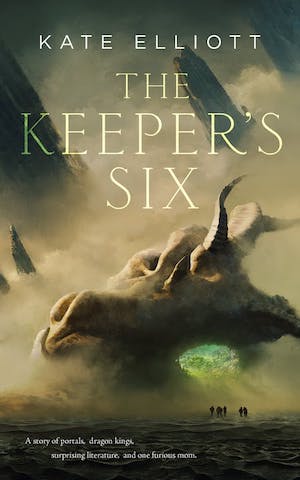

The Keeper’s Six
The episode is full of little departures from Martin’s original, sometimes clarifying one of the conflicting accounts presented by Archmaester Gyldayn, sometimes combining them, and sometimes sowing more doubt. For example, in The Princess and the Queen, Lyman Beesbury (Bill Paterson—Fleabag’s father on Fleabag!) does die as a result of speaking out against Aegon’s claim, but it is because Ser Criston Cole (Fabien Frankel) slits his throat after he delivers his argument. In Fire & Blood, Gyldayn offers two other possibilities: that he was defenestrated by Ser Criston, or else that he was taken to the dungeons where he caught a chill and passed a few weeks later. House of the Dragon chooses to answer the question of exactly how Lord Beesbury meets his end, but makes the motivations behind it far less legible. Here, Criston Cole forces Beesbury back into his chair with such force that Lord Lyman slams his head into his orb of office, cracking his skull. The possibilities that Gyldayn offers painted Beesbury’s death as either deliberate and malicious or else completely accidentally and unanticipated. The show leaves us wondering: did Ser Criston intend to kill him or was it merely an act of carelessness?
Similarly, Gyldayn’s two sources both agree that Prince Aegon was found with a mistress on the night of his father’s death, but the pious Septon Eustace proclaims it was the well-cared-for daughter of a wealthy merchant while the salacious court fool, Mushroom, insists it was an underage girl who performed obscene acts upon him while he watched two feral children fight for his pleasure. The show excises the bit about the mistress but turns the most horrifying part of Mushroom’s oft-embellished text into a reality where there is an entire feral-child fighting ring in the depths of Flea Bottom. The show, again, errs on the side of uncomfortable moral ambiguity: Aegon did not command the children to fight for his pleasure (as Mushroom insists) but he is a regular patron of King’s Landing’s most horrifying bloodsport and, perhaps, has even left a bastard child behind as a future competitor.
Perhaps the most dynamic change in the events of this episode, however, is the escape of Rhaenys Velaryon (Eve Best), whose dramatic showdown with the Greens from dragonback is wholly an invention of the show. The Queen That Never Was is safe on Driftmark during the Green Council’s coup in Fire & Blood, which means that there is nothing in the text about her secret escape, her presence at the coronation, or Meleys bursting from the bowels of the Dragonpit. Keeping her in King’s Landing gives us both that spectacular ending and her conversation with Alicent in which Rhaenys translates the subtext of Alicent’s tragic loyalty to the patriarchy into text. The show has been quite adept at altering its source material in order to better serve its characters—we will see if that trend continues through the end of this season and beyond.
Odds and Ends
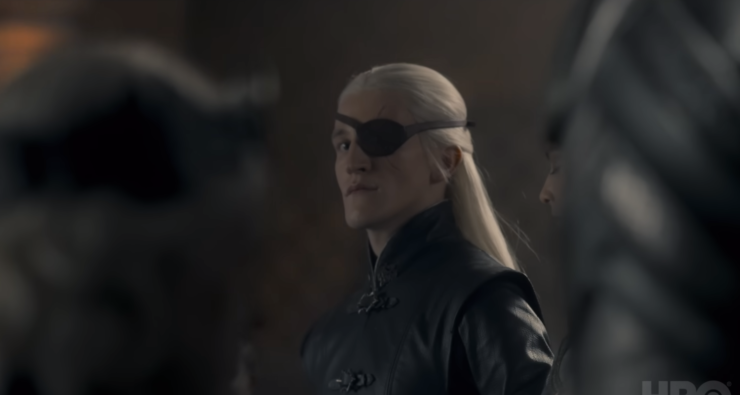
Ser Harrold Westerling
The meeting of the Green Council also features the baring of steel between Lord Commander Harrold Westerling (Graham McTavish) and Ser Criston Cole. By this time in Fire & Blood, Ser Harrold has long since passed of old age, giving Ser Criston carte blanche as Lord Commander. I have no idea what the show has planned for Ser Harrold—but surely they would not have cast the venerable McTavish if they didn’t plan on having him do something memorable before he makes his exit.
Little Vignettes Amidst the Coup
In Fire & Blood, twin Kingsguard knights, Ser Arryk and Ser Erryk Cargyll, are already separated, with the former serving on the Kingsguard in King’s Landing and the latter serving the heir apparent, Rhaenyra, on Dragonstone. The show uses the episode as an opportunity to show their growing distance, with Erryk trying to convince his brother that Aegon is unfit to rule before eventually giving up on trying to sway him, instead attempting to spirit Rhaenys out of King’s Landing.
The episode also gives us a few scenes of internal struggle with Allun Caswell (Paul Hickey) who is a footnote in the novel as one of the first Lords, loyal to Rhaenyra, to be killed by the Green Council. Here he becomes a small point of audience identification for how the minor nobility of King’s Landing try to navigate the ever-shifting political landscape.
Familiar Leitmotifs
There has been plenty of criticism over the choice to reuse Ramin Djawadi’s iconic theme from Game of Thrones, which now serves, unaltered, as the opening music for House of the Dragon. I will say that I would have preferred some sort of thematic riff on that particular track, but otherwise the show has not lacked for impressive attention to musical detail. Two weeks ago, Aemond’s first flight on Vhagar contained a bit of Daenerys’ leitmotif, right at the moment that the rider gets the hang of flying. Tonight, as Aegon entered the Dragonpit for his coronation, the heralds played a riff on their fanfare trumpets that referenced the theme reserved for the King’s procession in the original Game of Thrones and can be heard, most prominently in “The King’s Arrival” and “The Throne is Mine.” Those little auditory details work wonderfully to create a continuity between the shows that bring the larger world to life.
***
“The Green Council” continues the upward trajectory of great episodes at the tail end of this inaugural season. By giving the uniformly excellent cast plenty of time to engage in quiet, portentous moments and conversations, the show is lending a necessary weight and complexity to the thin characterization that Martin’s source material—with its historical distance and a narrator plagued by a desire for objectivity—demands. It also proves that it can give us the grand spectacle that the early seasons of Game of Thrones attempted but did not quite have the budget to fully capture. Rhaenys, astride Meleys, the Red Queen, facing down the Green Council before choosing to spare them is as iconic an image as any we’ve seen in either show, and feels like it may be the first of many more.
But what did you think? Were you drawn in by the series of two-person scenes, reflecting on the nature of family and power? Are you eagerly anticipating the finale next week? Book readers, though I encourage you not to spoil anything, are you as excited as I am by the trailer for next week’s episode and the events that seem to be taking place in it? Let me know in the comments below!
Tyler Dean is a professor of Victorian Gothic Literature. He holds a doctorate from the University of California Irvine and teaches at a handful of Southern California colleges. He is the author of “Distended Youth: Arrested Development in the Victorian Novel” and his article “Exhuming M. Paul: Carmen Maria Machado and Creating Space for Pedagogical Discomfort” appears in the most recent issue of Victorian Studies. He is one half of the Lincoln & Welles podcast available on iTunes or through your favorite podcatcher. His fantastical bestiary can be found on Facebook at @presumptivebestiary.










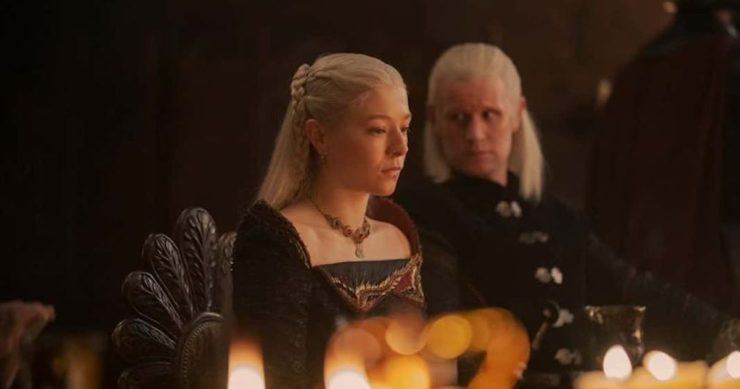
Best episode by far of the season. Last week’s was quite good as well so I’m hoping that continues as we move to the season finale. The tension in this episode was excellent and reminded me so well of some of he best GoT had to offer. Still in my top 3 scenes all time in the first series was the conversation in season 1 between Robert and Cersei on their marriage and the bitter, unspoken sadness they both felt in the way their lives turned out. Alicent and Rhaenys’ conversation reminded me much of that scene in tone and emotion if not so much the content.
Which doesn’t make much sense, since earlier in the show Alicent is grooming her son to be king. The showrunners don’t seem to be able to make up their mind about how complicit in this whole affair Alicent should be. They don’t want to portray her as being dragged along, since that strips her of the agency she had in the book, but they also don’t want to portray her as coldheartedly scheming as she was portrayed in the book. The result is a character who seems a bit schizophrenic in her motivations. It would have been better if the showrunners had just made a choice and stuck with it. At any rate, that scene with Larys pleasuring himself over her feet was one of the most distasteful bits of television I’ve seen in a while.
The whole Mysaria sideplot didn’t work for me, largely because Sonoya Mizuno is not a good actor. I don’t know what they’re planning to do with the character, but I hope it doesn’t involve any more speeches of any significant length.
That “spectacular” ending was just silly. If Rhaenys was escaping to align herself with Rhaenyra, why on earth didn’t she just wipe out Aegon II right then and there? I guess the obvious answer is that there would be no further show if that happened, but the writers shouldn’t have created that situation. That she just takes off makes no sense.
Overall, I thought this was a pretty weak episode, other than the fact that it fleshed Aemond out a little bit, which was nice. They seem to be propping him up to be a sort of Daemon-like character, which is fitting given their fates.
It looked to me as if Alicent knew full well what Larys was doing, which leads me to wonder how they made their arrangement. On second thought, I don’t want to know.
I don’t have much of an ear for music (that’s actually an understatement), but I’d swear I heard notes from “The Rains of Castamere” in the incidental music during the conversation between Rhaenys and Alicent.
Otherwise, I’m afraid I agree with 2. Not bad in showing the scheming and corruption of the Hightowers — Otto as Tywin Lannister, Aegon as Joffrey — but otherwise meh.
2. David Pirtle
At any rate, that scene with Larys pleasuring himself over her feet was one of the most distasteful bits of television I’ve seen in a while.
I fully agree. In other reviews during the season I have seen Larys being compared to Littlefinger. That should not be a surprise, but in my opinion it sells Littlefinger short since (little scumbag as he was) at least he had flair.
In the beginning of the season I was wondering if I would finish it since Daemon was the only character I found interesting. But after the actor switches with some of the main characters that changed, probably because the acting/ actors were better.
For the record, I haven’t read the book but I am enjoying the show now. When Rhaenys barged into the crowning ceremony I was like ‘Say it, go and say it’ (Dracarys) although I knew she wouldn’t do it.
@2 That “spectacular” ending was just silly. If Rhaenys was escaping to align herself with Rhaenyra, why on earth didn’t she just wipe out Aegon II right then and there?
My read is that she was planning to do exactly that, but changed her mind when the moment came. Which in turn calls back to the argument between Alicent and Otto over murdering Rhaenyra and her family.
@2. David Pirtle & @5. Jason Ipswich: My reading of the situation was that Princess Rhaenys was fixed in “escape” mode, rather than “fire & blood” mode – it’s interesting that we don’t get a scene showing if that lady faced any further obstacles after making her way into the underbelly of the Pit, since this would make her thinking less ambiguous – also that the Princess, while more fierce than the late King Viserys, is no by no means more inclined to become a kinslayer.
Also, I’m reasonably sure this episode ought to be subtitled “The Green Council OR two reasons Aerys the Second hired the eunuch” (Wait a moment – Lord Larys Strong, Sir Otto Hightower, Prince Aegon the Elder, make that THREE reasons).
An update to my earlier assertion/confusion about Otto Hightower being portrayed as part of Alicent’s bloodstream: apparently the show is including Viserys and Alicent’s youngest son, Daeron Targaryen, which Martin confirmed in an interview published earlier this week. Daeron spends most of his childhood in Oldtown, being fostered by Alicent’s Uncle (and, later, her cousin) which explains his absence. I had assumed the show had intentionally left him out and would use other characters (perhaps Criston Cole or Hobert Hightower) to fill in Daeron’s role in later seasons. Anyway, that is Daeron’s dial in the opening credits!
And yet she is running off to help launch a civil war which she knows can only end in the death of either Aegon II or Rhaenyra. The show has portrayed her so far as one of its smartest people, but here it places her in the position to win the war before it even starts, but no, she just runs away. It was an ill-concieved scene that put spectacle above sense.
I guess what I’m trying to say is that considerations about “kinslaying” mean little when we’re talking about a conflict between two branches of the same family. All the dragonriders who will be doing battle in the comimg war are related. Rhaenys isn’t too stupid to realize that “kinslaying” is something they’ll all be engaged in soon. So why does she not act? Like I said, the only answer is that would be the end of the show.
I was just bored by this episode (except for the foot fetish scene, the less said about which the better).
The whole “where’s Aegon” really seemed to go nowhere at all, and served no plot function as far as I could tell. Oh wait! We’re introduced to two new characters, Erryk and Arryk, who are identical twins! Somehow we’re supposed to keep them straight! What larks.
A whole lot of empty conflict to no purpose with the two most interesting characters, Rhaenyra and Daemon, off-screen for the entire episode. Oh wait! Ser Beesbury has a pulse! He speaks in something besides a whisper or jaded tone! He seems to have principles or to stand for something besides naked self-interest! Oh wait, he’s dead.
There is no explanation for why Rhaenys didn’t nuke the coronation party. But boy it looked cool!
@9 & 10. David Pirtle: I’d argue that, even in Westeros on the brink of war, locals can recognise the difference between legitimate warfare and plain murder – does Helaena Targaryen, unarmed & harmless, deserve to die with her brothers, mother & grand sire? – so it would be entirely in character for a warrior aristocrat to consider mere assassination beneath them, while being entirely content to kill the same target in battle.
It’s a worldview difficult for we moderns to understand (and quite probably harder still for many of us to agree with), but the logic seems consistent with what we see of Princess Rhaenys’ conduct to date (though I am, in all honesty, more inclined to sympathise with NOT murdering the innocent along with the guilty, especially at a point in time where War is a serious probability but – let us remember – has not yet been declared*).
*For the same reason I am entirely sympathetic to Queen Alicent’s quashing of Sir Otto’s damn-fool notion of sending the Kingsguard to assassinate Princess Rhaenyra et al (This very episode makes it very clear that Sir Otto is not nearly as all-knowing and entirely in control as he believes himself to be: also note that the Hand has previously been shown to seriously underestimate Daemon Targaryen’s ability to defend Dragonstone – being saved from the consequences of his folly only by the intervention of Princess Rhaenyra herself! – so it’s dangerous to accept his plans as the best possible choice under the circumstances).
On an unrelated note, I disagree that the actress chosen to play Mysaria of Lys is bad at her job, but I would agree that either she made a poor choice (or received poor direction) by sticking with that peculiar accent after the various time skips gave her an opportunity to modulate into something a bit less thick (suggesting a natural progression from “fresh off the boat” to “part of life’s rich tapestry”).
Were I allowed to offer the actress some advice, it would be to scale back the accent unless the character is either trying to fool somebody or making a point (For example by making it blatantly clear that the High & Mighty Hand of the King has been forced to the bargaining table by a mere immigrant madame)
She already killed a bunch of innocent people by erupting through the floor of the Dragonpit while it was full of common citizens packed cheek to cheek. A whole lot more innocent people will die in the the coming conflict she’s flying off to wage. She can’t be so naive as to think otherwise. It was just poor writing to put her in the position to end the war before it began by taking out all of her enemies in one breath of her dragon.
@14. David Pirtle: I’ve seen this point consistently raised, but it bears pointing out that merely “killing the dictator” does not guarantee that the war will be stopped – remember that the Hightower/Targaryens are merely the tip of the lance, they’re not working in isolation – and that the Green Council, the House Hightower & other interested parties still have Prince Daeron (who has been confirmed to exist in this timeline) and the children of Aegon II to fall back on.*
Killing Aegon II and everyone near him changes the shape of the war, but remember that Maegor the Cruel started his war on the Faithful with a massacre, possessed a monopoly on dragons of military age and STILL lost in the end.
I doubt this affects Princess Rhaenys’ thinking, but I do feel that audiences are unwise to treat “dracarys!” as a surefire way to stop the coming war (any more than the deaths of King Joffrey & Lord Tywin, the flight of Tyrion Lannister and the arrest of the dowager Queen put an end to the “Baratheon” Dynasty so many years later.
*In fact being able to fight for an innocent child orphaned by a treacherous kinslayer at an unprovoked massacre might make the Green cause MORE attractive than being obliged to swear one’s life & honour to Aegon II.
That’s not really a rebuttal so much as the point. All of the participants in the Dance of the Dragons involved in the actual killing are abominated in Westeros history for their deeds.
Re: Rhaenys not killing them by dragonfire:
I took that scene as when the moment came, she looked at her family and just couldn’t do it. Yes, there’s a war coming, and yes, she’s chosen to side with the Blacks, but all those people on the dais are still family. And she couldn’t burn them.
So she just left (after a loud dragon roar to show she could have hurt them).